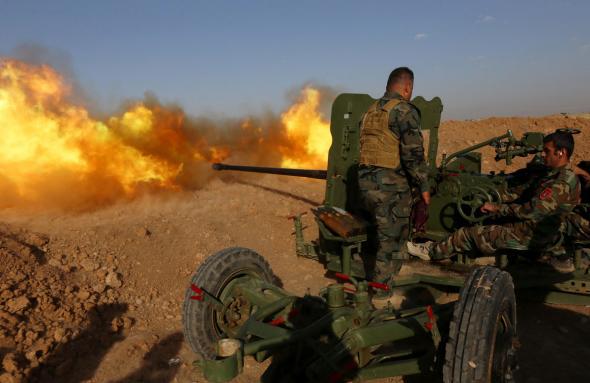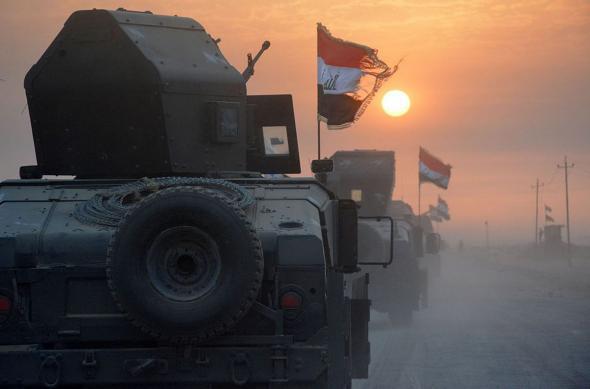And so the long-awaited battle for Mosul has begun. ISIS will almost certainly lose. Its fighters are outnumbered 10-to-1; they’ve never had to stave off a choke-and-squeeze offensive from all sides; and the city’s residents, many of whom have grown to loathe its oppressive occupation, will more likely aid than resist the liberators.
But the main question isn’t whether ISIS will lose. Rather, it’s who will win. Many factions are involved in this assault: the Iraqi army and police, the Kurdish peshmerga, Sunni militias, Iranian-backed Shiite militias, the Turkish army (standing by: more on that later), and the United States in the form of special forces, airstrikes, and intelligence operations. Most combat coalitions share at least basic strategic interests; that is not the case with this motley crew.
From a strictly military standpoint, the assault on Mosul could have been launched months ago. The delay, according to officers and officials on the ground, stemmed from political disputes within the coalition. These disputes were over the classic questions of political power: Who does what in the battle, and who gets what afterward?
It took months for U.S. commanders and emissaries to prod the factions into agreement on these matters. Hence the elaborate, phased division of labor that’s been outlined by military briefers: Iraqi security forces moving up from the south; Kurds headed from the east, but stopping short of the city itself, leaving the actual entrance to Iraqi special forces, followed by Iraqi police and Sunni tribesmen. (Mosul is a multiethnic city, but the Sunni majority initially greeted ISIS as liberators, and many fear that if these citizens view the offensive as a prelude to renewed Shiite oppression—as was the case under Iraqi’s former prime minister Nouri al-Maliki—then they might turn for relief once again to ISIS or something like it.)
The question is whether the coalition’s plan will survive the chaos of battle. If the Iraqi army falters (or even if it doesn’t), will the Kurds push forward? If they do, the Turkish army is likely to step in, not to help defeat ISIS but to crush the overly ambitious Kurds. (Turkish troops are poised at the border, not far from Mosul, to move in, if need be.) Similarly, if Shiite militias—who are also supposed to stop short of the city—extend their reach, the Sunni tribesmen might turn their attention away from ISIS to keep their existential rivals out.
In other words, this delicately crafted operation to retake Mosul could morph into a five-sided shitstorm.

Safin Hamed/AFP/Getty Images
Then there are the obstacles facing even a highly unified force in urban combat. Though many residents have fled Mosul to avoid the coming onslaught, about a million have stayed behind. The U.S. commanders have advised them to stay indoors and thus avoid the crossfire, but this form of caution might not protect them from errant bombs (or quite accurate bombs aimed at the terrorist upstairs) or from ISIS tactics to use them as human shields. The warning also raises questions of whether, or to what extent, U.S. and Iraqi forces know where the ISIS fighters are. Will these jihadists come out and fight, or will they stay inside too? There are reports that Mosul residents are marking the doors of ISIS houses with an “M,” to help the liberators—but might ISIS do the same, to lure the infidels into killing innocent people and thus sparking resistance?
Some officers have said that door-to-door fighting could go on for months. They might simply be engaging in an expectations game, so that, if the battle lasts a mere few weeks (which can seem an eternity on cable and satellite newscasts), it will seem remarkably brief. Similar notes of pessimism preceded the U.S.–led invasion of Iraq in March 2003. Once the troops get to Baghdad, commanders noted, the street fighting could get fierce. In fact, though, the tanks rolled in, unopposed, in the wake of Saddam’s departure and the security structure’s collapse. The ISIS fighters in Mosul—thought to number about 3,000 (against the 30,000 coalition soldiers involved in the offensive)—might collapse as well. Then again, they might not. Nobody knows.
In any case, the more intense and prolonged war could come after this battle. Who establishes and maintains order? What happens to the hundreds of thousands of refugees? Who leads them back into their city, and who provides for their welfare? What happens to the fired-up militiamen and tribesmen who have helped oust the jihadists: Will they be given a role in securing and governing the post–ISIS Mosul and its surroundings—and if they’re kept out of the power structure, as has tended to happen in the past, will they choose to keep fighting? Such sectarian rivalries have triggered and intensified all the fighting in Iraq since the immediate aftermath of the U.S. invasion. A shared victory in retaking Mosul might help overcome some of those tensions—might serve as the basis for cooperation in the politics that follow the fighting—but, if past is precedent, the odds of ensuing harmony aren’t great.
The battle for a Mosul is a necessary battle, and the American role in that battle is, though limited, essential. Mosul was the first major city that ISIS overwhelmed; it was where its leader, Abu Bakr al-Baghdadi, made his first (and only) public appearance, proclaiming Mosul as the Iraqi capital of his caliphate. ISIS has lost three-quarters of the territory that it once held in Iraq and Syria. Many of the links connecting those enclaves have been severed. Retaking Mosul could deal a severe, perhaps mortal, blow not only to the organization’s morale and its recruitment drive (both of which are already in crisis) but also to any pretense of a tangible “Islamic State.”
But winning the battle of Mosul doesn’t necessarily mean ending the bloodshed in Iraq, much less in the region.
